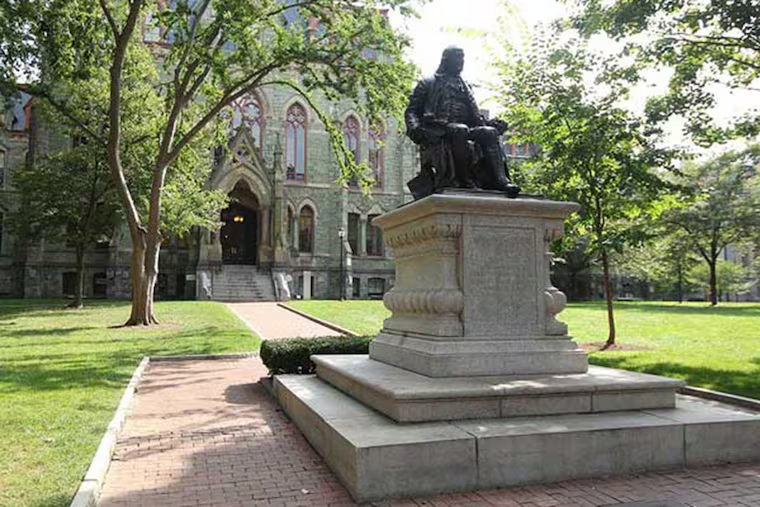Pushed by the pandemic, faculty want a greater voice in decisions at Penn and other campuses
A new chapter of the American Association of University Professors at Penn is one of a growing number nationally that come as colleges are battered by the pandemic.

There’s a new group on campus at the University of Pennsylvania and members say their goal is seeking greater voice for faculty and pushing the school toward a less corporate and more socially conscious agenda.
“We are meant to be the heart and soul of the research and educational mission of the university, but increasingly that mission is being consolidated into a few central offices on campus,” said Suvir Kaul, an English professor and president of the newly formed chapter of the American Association of University Professors, a professional association.
The AAUP chapter at Penn is an advocacy group with dues-paying members, not a union. It’s one of a growing number of AAUP chapters nationally that come as colleges are battered by the pandemic and faculty are feeling increasingly frustrated with decisions being thrust upon them.
In 2020, 69 AAUP chapters formed at colleges around the country, including five in Pennsylvania, said Christopher Simeone, the AAUP’s director of organizing and services. That’s up from 36 chapters the year before. There are about 600 chapters nationally with about 45,000 members. Other local campuses with chapters include Drexel, La Salle, Delaware Valley, Pennsylvania State, Lincoln, Rider and Rutgers Universities, according to the AAUP’s website.
» READ MORE: Penn's new student leaders identify as first-generation college students from lower income families
“We’re seeing that faculty are coming together and using the chapter as a means to address a variety of issues that have come up as part of the COVID crisis,” Simeone said.
Many of those issues, such as increasing financial pressures on universities, have been mounting for years, he said, and the pandemic became the flash point.
While some AAUP chapters are unionized and engaged in collective bargaining, others, like Penn’s, are not. Nonunion chapters can strengthen faculty voice and create collective power to work for change in institutional policies and enforcement of AAUP standards, Simeone said.
“We have no plans to be a union,” Kaul said, noting that there is almost no path for tenured professors at private colleges to unionize under current law.
Faculty are seeking a greater voice in decision-making, Kaul said. Too often university leaders and deans are making decisions without consulting department heads or other faculty, he said. Faculty in arts and sciences were stunned a few months ago when the dean announced the school would admit no new Ph.D. students next year as part of financial belt-tightening due to the coronavirus, he said.
Penn declined comment on the new chapter.
In its news release, the group vowed to fight for more faculty involvement, better working conditions for all employees — including equitable pay for all ranks and a redress of inequities in salary and promotion for women and faculty of color — and “to advocate for the most vulnerable members of our community.”
“We believe in higher education for the common good, and we stand for a more egalitarian conception of the university, for racial justice and gender equality on and off campus, and for a deeper structural commitment to the Philadelphia communities that enable us to function,” the group said.
The group plans to gather information and make public statements about issues of concern in the hope of driving change. Kaul said one thing it will do is survey faculty about whether they think they are paid comparably to their colleagues and release the findings.
The group’s membership, largely concentrated in Penn’s School of Arts and Sciences, is approaching 100 of Penn’s nearly 4,900-member teaching force, Kaul said. Members include tenured and nontenured educators, adjunct faculty, and graduate students who are teaching and doing research. It will take time for word to spread about the chapter and membership to grow, he said.
It’s not the first time Penn has had an AAUP chapter. There was one as recently as 2003, but it died out, he said.
At Penn, there’s been a struggle over whether the university should behave like a corporation or pursue a more socially conscious agenda, said Andrew Lamas, an urban studies professor. Like other institutions, Penn has been promoting more deans and leaders of color, which is good, he said. But at the same time, the university has done little to help working-class women and minority employees in jobs such as security guard, secretary, and food service, paying them low wages and outsourcing some of their jobs, he said.
» READ MORE: Penn to donate $100 million to the Philadelphia School District
Many of those in the new chapter also were involved in the effort to have Penn make payments in lieu of taxes and still think it should, even though Penn announced in November that it would donate $100 million to the Philadelphia School District over the next decade.
“There are a number of groups on campus that are pushing forward a vision of campus that we share and we will push forward with them and as faculty, we will amplify their concerns,” Kaul said.